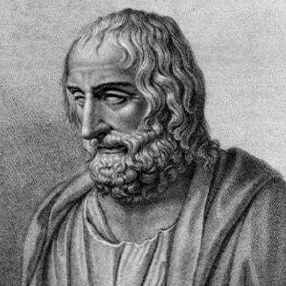translated by H. D.
Birds from Parnassus,
swift
you dart
from the loftiest peaks;
you hover, dip,
you sway and perch
undaunted on the gold-set cornice;
you eagle,
god’s majestic legate,
who tear, who strike
song-birds in mid-flight,
my arrow whistles toward you,
swift
be off;
ah drift,
ah drift
so soft, so light,
your scarlet foot so deftly placed
to waft you neatly
to the pavement,
swan, swan
and do you really think
your song
that tunes the harp of Helios,
will save you
from the arrow-flight?
turn back,
back
to the lake of Delos;
lest all the song notes
pause and break
across a blood-stained throat
gone songless,
turn back,
back
ere it be too late,
to wave-swept Delos.
Alas, and still another,
what?
you’d place your mean nest
in the cornice?
sing, sing
my arrow-string,
tell to the thief
that plaits its house
for fledglings
in the god’s own house,
that still the Alpheus
whispers sweet
to lure
the birdlets to the place,
that still the Isthmus
shines with forests;
on the white statues
must be found
no straw nor litter
of bird-down,
Phœbos must have his portal fair;
and yet, O birds,
though this my labour
is set,
though this my task is clear,
though I must slay you,
I, god’s servant,
I who take here
my bread and life
and sweep the temple,
still I swear
that I would save you,
birds or spirits,
winged songs
that tell to men god’s will;
still, still
the Alpheus whispers clear
to lure the bird-folk
to its waters,
ah still
the Isthmus
blossoms fair;
lest all the song notes
pause and break
across a blood-stained throat
gone songless,
turn back,
back
ere it be too late,
to wave-swept Delos.
This poem is in the public domain. Published in Poem-a-Day on September 18, 2022, by the Academy of American Poets.
“The Bird-Choros of Ion” first appeared as a part of Euripides’s Ion, believed by scholars to have been originally composed in Ancient Greek sometime in the early fourth century BC. It later appeared in an English translation in H. D.’s Heliodora (Houghton Mifflin Company, 1924), and again in 1934 when she went on to translate the play in its entirety. The scene depicts the orphan Ion, who, in his apostrophe to the birds that would otherwise roost there, warns that he will keep the steps of the Temple of Apollo clean with the threat of force from his arrows—though not without a certain remorse. About H. D.’s translation practice, Eileen Gregory writes, in “H. D. and Translation,” that “[a] significant formal invention comes from H. D.’s early translation—what she repeatedly called the ‘choros,’ ‘choros-sequence,’ or ‘choros-series’—and, along with it, experiments in lyric voice. Her early ‘choruses’—an amalgam of the choral odes with some monologues in lyric metres—represent a lyric sequence. This form allows H. D. an oblique lyric rendering of dramatic action, one which, especially in Euripides, is highly imagistic and affective. Spatial and temporal dimensions are likewise complex, since the chorus shifts between a mythical past, a present witnessing, and an emotionally charged projection of the future. Moreover, this form in H. D.’s practice allows her to explore lyric polyphony—the choral voice put beside monologues and dialogues, thus creating a persistent shift and reorientation of voice and consciousness. Another kind of polyphony is suggested in the choral voice itself, which is simultaneously ‘I’—with a distinct set of emotions, perceptions, and responses—and ‘we’.”

